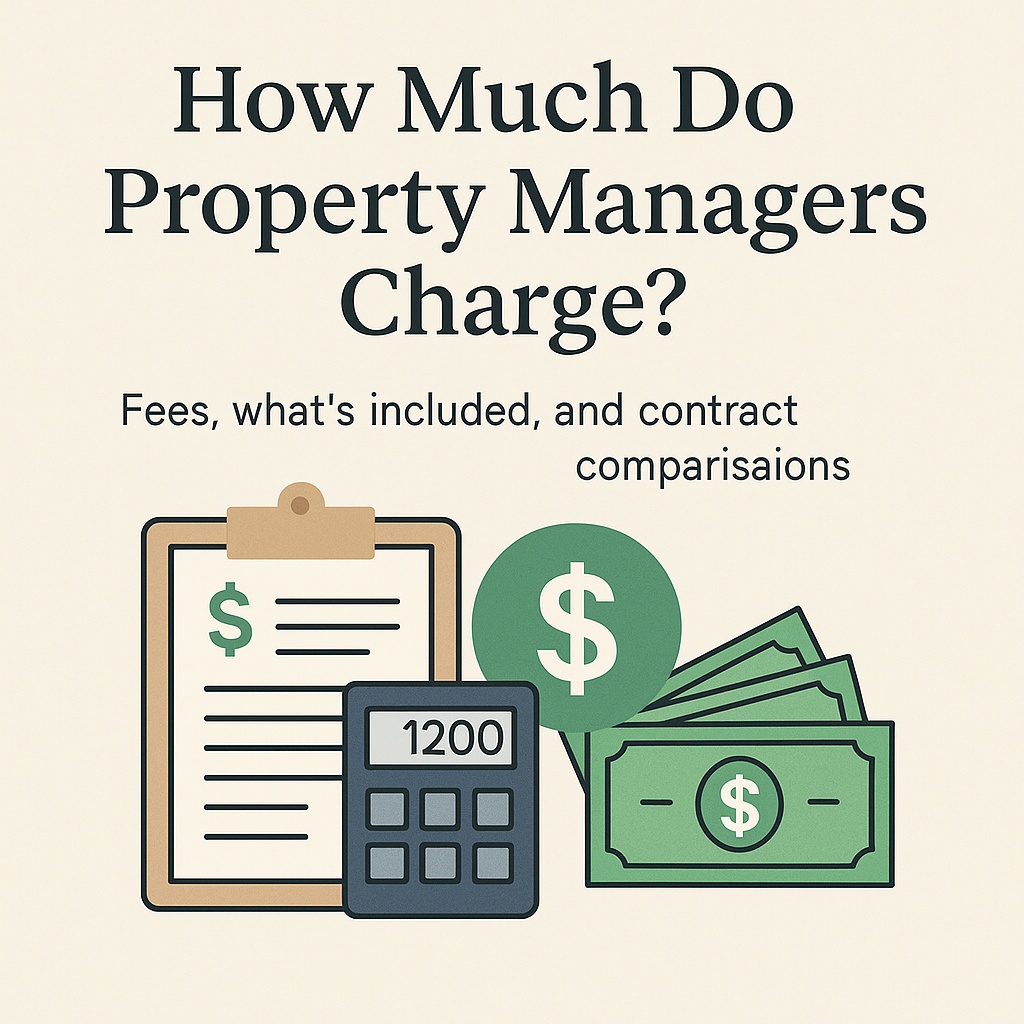How Much Do Property Managers Charge?
Property management fees vary widely depending on market conditions, property type, portfolio size, and level of service. While many companies advertise a simple percentage rate, the true cost of management includes setup, leasing, renewals, maintenance coordination, and other service layers. To make an informed decision, landlords must look beyond headline numbers and focus on total annual costs, value, and accountability.
1) Typical Fee Structures in New Jersey
Most property managers charge either a percentage of collected rent or a flat monthly fee per unit. The percentage-based model remains the most common, but hybrid structures are becoming more popular for larger portfolios or single-family homes.
- Percentage of monthly rent: Usually between 8% and 12% of collected rent. Urban markets and full-service firms may charge higher rates, while larger multi-unit owners may negotiate lower percentages.
- Flat fee per unit: Some companies charge a fixed amount per door (e.g., $100–$250/month) regardless of rent level, ideal for high-value or luxury units.
- Minimum fees: If a property sits vacant or has low rent, many managers set a minimum monthly amount to cover overhead costs.
2) Leasing and Lease-Up Fees
In addition to monthly management, most companies charge a leasing fee or lease-up fee to fill a vacancy. This compensates for marketing, showings, tenant screening, and lease execution.
- Typical range: 50% to 100% of one month’s rent per new lease.
- Includes: Listing photos, online marketing, showings, background checks, income verification, lease signing, and move-in inspections.
- Ask about renewals: Some firms also charge a smaller renewal fee ($100–$300) to handle paperwork and lease extensions.
When comparing companies, confirm whether leasing fees are charged per vacancy or per signed lease, and if renewals are included in the base rate.
3) Other Potential Add-On Fees
Property management contracts can contain various optional or situational charges. These are not necessarily bad, but they should be clearly defined upfront.
- Setup/onboarding fee: A one-time charge (typically $100–$300 per property) for establishing accounts, bank connections, and system setup.
- Inspection fee: May apply for detailed move-in/move-out or periodic property inspections.
- Maintenance coordination fee: Some firms add 5%–10% markup on vendor invoices or charge flat coordination fees for repair oversight.
- Eviction coordination: Covers court appearances, notices, or coordination with attorneys (often $150–$300 plus legal costs).
- Project management: Large renovations, turnovers, or insurance claims may incur oversight fees, usually a small percentage of the project cost.
4) What’s Usually Included vs. Extra
Not every management agreement covers the same services. Understanding what’s bundled in the base fee—and what triggers extra charges—prevents unpleasant surprises.
- Typically included: Rent collection, accounting, basic maintenance coordination, tenant communications, and monthly financial statements.
- Often extra: Major capital projects, extensive turnovers, premium marketing (like professional photography or 3D tours), court filings, and after-hours specialty maintenance.
- Optional premium tiers: Some firms offer tiered packages (basic, full-service, premium) with escalating levels of oversight and reporting.
Clarify which services are “reactive” (included when issues arise) versus “proactive” (preventive inspections, seasonal maintenance, or rent increase analysis).
5) Understanding Maintenance Markups and Vendor Costs
Maintenance markups are one of the most misunderstood aspects of property management. While some landlords see them as an added expense, they often cover the administrative time required to coordinate vendors, obtain estimates, and verify completed work.
- Typical markup: 5%–10% on vendor invoices, or a flat coordination fee.
- Transparency tip: Ensure the markup and approval thresholds (e.g., “repairs over $300 require owner approval”) are clearly written in the agreement.
- Value add: Managers often secure preferred vendor pricing, so even with markups, total costs may still be lower than retail rates.
6) How to Compare Contracts
When reviewing management proposals, don’t focus solely on percentages. The goal is to calculate your total annual cost at your expected occupancy, rent level, and turnover rate.
- Map services to fees: Create a spreadsheet listing what’s included under each company’s base rate, leasing fee, and add-ons.
- Review termination terms: Understand notice periods (commonly 30–60 days) and any early cancellation penalties.
- Check exclusivity: Some contracts restrict you from leasing or managing your property through other agents during the term.
- Model real-world scenarios: Estimate total cost for one year including one vacancy, one renewal, and standard maintenance to see the full picture.
Pro Tip: Ask each company for a sample monthly statement or owner report—this reveals how they communicate financial data and track performance.
7) What to Look for Beyond Price
Cheaper isn’t always better. A property manager who charges slightly more but maintains lower vacancy rates, better tenants, and cleaner accounting can deliver far greater net income. Look for transparency, responsiveness, and a reputation for integrity over discounts.
- Ask for references from owners with similar properties.
- Check online reviews for responsiveness and professionalism.
- Verify that the company is properly licensed and insured in New Jersey.
- Look for firms that provide detailed reports, photos, and clear communication portals.
8) Calculating True ROI
The best way to compare management fees is by projecting your net return after all expenses. Consider occupancy, turnover costs, and your time value. If a professional manager saves you even one vacancy month per year, their fee may already pay for itself.
Use tools like A&L Management’s Rent vs. Sell Calculator to estimate your annual income potential with and without professional management.
Mini checklist: Scope & exclusions • Maintenance markup • Renewal fees • Termination terms • Reporting cadence.
Disclaimer: This article is for informational purposes only and not financial or legal advice. Always review management agreements carefully and consult a qualified professional before signing any contract.

